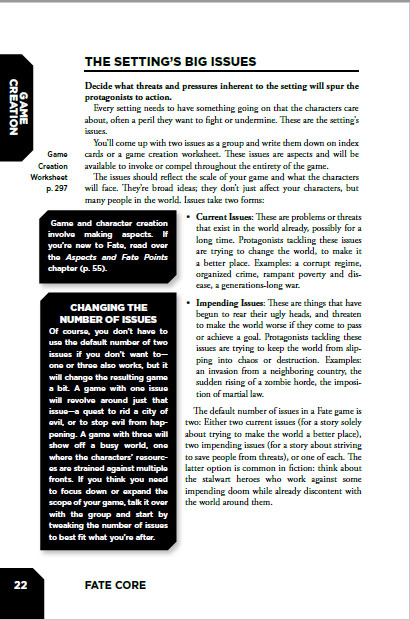I have chosen an alternative question today as I had no real answer to the default question and I didn’t want to do that two days running.
It is also relevant to the regulars here on the blog. We are all heavily leaning towards publishing, have published, are waiting to publish or want to publish.
I have two answers to this. First up I like books or more rightly the companions that make you think that the content should have been core right from the start. Books that solve so many problems or things you have had to wing during a session and finally you have an answer for. Players will always try to push the limits and one of the first things they will always want to do is swing two swords not one, pull two pistols not one or fire some machine gun from the hip. They do it in the movies so PCs should be able to do it in game. Books that make those problems go away are the special ones.
Answer two is more about book and page layout. Some books just make using them so incredibly easy. I don’t like the game system FATE but for book design I have seen very few to beat it. I have put an example below. The chapter tab on the side of the page makes thumbing through to find the right chapter easy, the cross references are obvious and and not buried deep in the text. The page contains no art but remains attractive to the eye by breaking up large blocks of text. I have held this book up as an example of great page layout and it does make the book a joy to reference even if the game is dreadful (IMHO).



I like good internal navigation, whether this is through such as internal hyperlinks, as seen in the Pathfinder core book, or good use of sidebars, as in the Ptolus book. In that book, when there are references on the page to something from another page, there is a note in the sidebar giving the page number (the sidebars are used for other material as well that isn’t directly connected to navigation.
Books, especially large PDFs, lacking indices, PDF bookmarks and tables of contents are horrendous.
PDF bookmarks are certainly essential. In printed books the index is vital as well. I hate having to hunt back and forth for rules.
I have seen books with over 200 pages that lack any, or any useful, PDF bookmarks. Which is a serious comfort issue.
I enjoy the later Companions from RM. in the back of the books is the master index of “stuff” with probably the single most important feature — The Companion and page number that items/rule/creature/spell list can be found.
We’re all familiar with the number of books in RM 2. The almost-countless optional rules, spells, items. The later companions have saved me so much time. In the forum this week, one poster asked which book the Arcist was from. Looking at one of the later companions, the Arcist would have been listed and on which page to find it.
Another feature I enjoy in an RPG book is a nice example demonstrating the math involved or the skill being attempted. RM is excellent for this. The little stories that go along with the example are entertaining and break up the monotony of studying a text book. I love the story of the Bag of Ogres in RMC-I I believe.
For some reason that I cannot pinpoint, I’ve loved the Vampire: the Masquerade books. The heavy, hardcover, the super shiny, bright white pages. The stories included, the introduction. I’ve read through the core book multiple times just for entertainment.
I always thought it would be cool if all the examples in a rulebook, and I mean all, were from one consistent story. So the rules on death dealt with the death of one of the characters but then the rules on lifegiving raised that same character. The damage and combat rules showed you how they died and so on. Then in the typical intro adventure that you get at the end of most rulebooks was exactly the adventure that the example characters had been through, so the example of drowning say was in an underground lake and then in the adventure there is an underground lake.
Is there an evil, octo-mancer in that underground lake?
The Octo-mancer will be back! He is not forgotten nor is the city of non-corporeal undead.